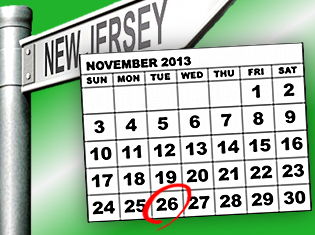 Online gambling in New Jersey will commence as planned at 9am on Nov. 26, according to information released Friday by the state Division of Gaming Enforcement (DGE). The DGE was required to confirm or deny the target launch date by next Friday (11), but apparently felt confident enough to have jumped the gun by a week.
Online gambling in New Jersey will commence as planned at 9am on Nov. 26, according to information released Friday by the state Division of Gaming Enforcement (DGE). The DGE was required to confirm or deny the target launch date by next Friday (11), but apparently felt confident enough to have jumped the gun by a week.
There’s as yet no indication how many operators will have their online sites ready to go by Nov. 26, but any operator hoping to meet that target will first have to complete a five-day “soft play” trial period beginning Nov. 21. This test-run will feature a limited menu of online gambling options and players will have to receive an invitation from the site in order to participate, but it’s not clear whether they’ll be playing for real-money stakes or not. Assuming there are no serious technical glitches or lapses in judgment, operators would then be authorized to offer full-fledged online gambling to New Jersey residents on the 26th.
The DGE will publish its officially revised regulations on Oct. 21, but in the meantime, it’s published the list of public comments it received during its consultation period along with its responses to these suggestions. The full document is viewable here, but we’ve summarized some of the highlights.
MISCELLANEOUS
With an eye toward a borderless online gambling future, the DGE insists that only players located within New Jersey’s borders will be able to wager online, “unless permitted by Federal law, the law of a foreign jurisdiction, or reciprocal agreement.”
Players won’t be required to log off from their online account to access their mobile account, and vice versa. Simultaneous play from the same online or mobile account on separate client terminals will be permitted, provided the system meets the DGE’s standards on guarding against cheating or collusion.
Operators will now be required to retain all data necessary to recreate patron gameplay for a minimum of 10 years in order to ensure historical verification of cheating, fraud or theft.
The requirement for licensees to refer all player complaints to the DGE within five days has been amended so that the timeframe applies only to complaints regarding player accounts, game outcomes and/or illegal activity.
Operators must provide electronic notification every time a player’s online account is accessed, but players can disable these notifications.
If a player’s session is inactive for 15 minutes, the session will no longer be automatically terminated. Instead, the player will be required to re-enter password info.
New Jersey-licensed online gambling operators will be able to offer free-to-play (F2P) games, but players can neither fund nor access these social games via their real-money online or mobile account. However, standalone F2P sites aren’t covered by the DGE, so have at it. Social games that offer players some kind of reward will also not be playable by persons under the age of 21.
Gaming device makers Bally, IGT and Aristocrat all tried to convince the DGE to let them store certain technical components outside Atlantic City’s territorial limits, but the DGE balked.
FINANCIAL STUFF
Operators must maintain a New Jersey-based bank account containing a sum greater than or equal to the total amount of player deposits. This account must be held separate from any other operator account.
Funds held in ‘dormant’ player accounts will still be subject to forfeiture, however, the state will now require operators to make this potential forfeiture clear to players in their T&C’s. Operator-initiated activity, such as the awarding of a bonus, will not prevent an account from being labeled dormant.
PokerStars’ parent company Rational Group tried to convince the DGE to permit player-to-player fund transfers within certain limits, but the DGE rejected this out of hand.
For state visitors seeking to gamble online, the DGE won’t prohibit the transfer of funds from a player’s online gambling account to a bank account located outside state borders. Players will also be allowed to access their accounts for non-wagering purposes while outside New Jersey’s borders.
Mastercard attempted to convince the DGE to authorize withdrawals from a player’s account to a pre-paid cash card other than that used to fund the account, but the DGE rejected this, calling it an invitation to money laundering. However, the DGE accepted Ultimate Gaming’s recommendation that players be allowed to withdraw funds to a pre-paid card provided that card has been verified as non-transferrable and issued to the player in question.
Payment processors have been reclassified from ‘ancillary casino service industry enterprises’ to ‘vendor registrants.’
PROBLEM GAMBLING
A problem gambler who requests to be temporarily blocked from accessing online gambling activity will be able to specify the duration of his/her “time out,” but it cannot be shorter than 72 hours. If a player has previously specified a monthly spending limit, they cannot apply to increase that limit until the month in question has run its course, but a request to decrease the limit could be applied immediately. A lifetime self-exclusion request – the “most extreme” responsible gaming control available – can only be made in person.
The requirement that a player’s session be automatically terminated once he/she reaches a self-imposed limit will now be dictated by the type of limit; i.e. if a player reaches a deposit limit, no more deposits will be permitted; if a spending limit is reached, no more wagering will be permitted, etc. The requirement to display the current time and the time elapsed of a gambling session has been amended to allow either a continuous time display or a pop-up every half-hour with the updated information.
